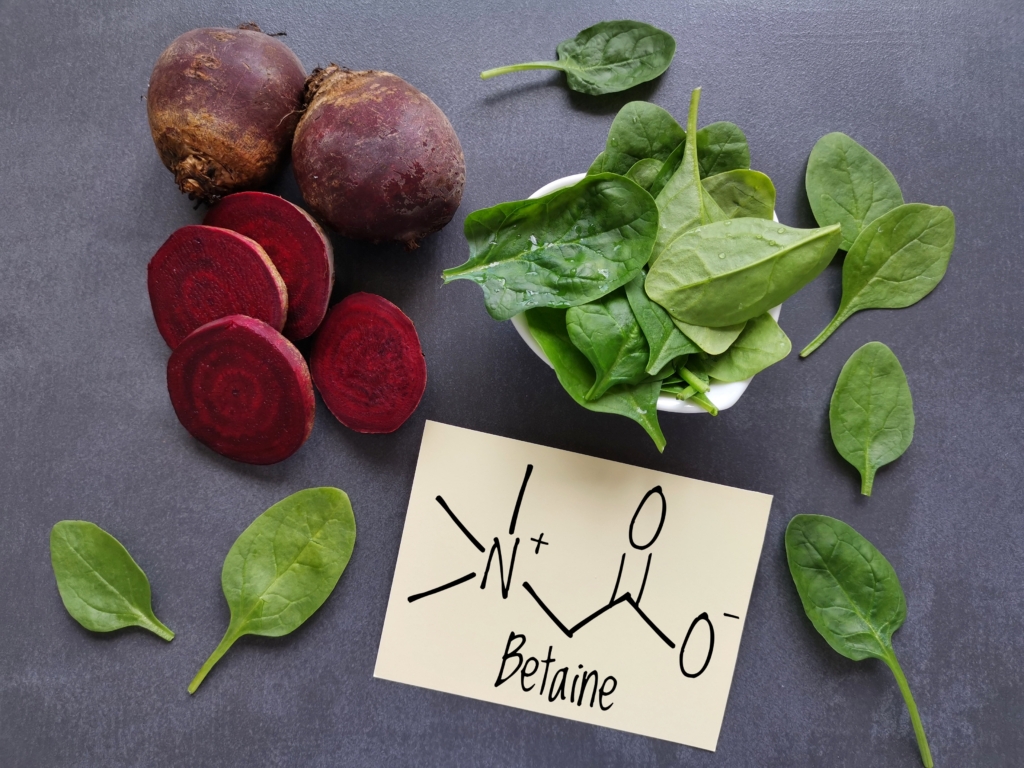Introduction
Betaine, also known as trimethylglycine, is a natural, multifunctional ingredient that is becoming increasingly important in cosmetics. It is able to protect cells from osmotic stress and plays a crucial role in regulating moisture in the skin, hair, and mucous membranes. In this blog article, we will explain its origin, benefits, and applications in cosmetics, as well as its scientifically proven effects. We will also take a look at the process of osmosis and the key role that betaine plays in it.
Occurrence and production of betaine
Betaine is mainly extracted from sugar beet (Beta vulgaris), which is a widely grown agricultural product. Sugar beet prefers to grow in temperate climates and is cultivated on a large scale in countries such as Austria and Russia. Betaine is extracted from the residues of sugar production, particularly sugar beet molasses, through a crystallization process. This sustainable method ensures that almost 100% of the plant material is used. This makes betaine not only an effective but also an environmentally friendly active ingredient.
Betaine is a white, crystalline powder with a faint smell of molasses. It is water-soluble and stable at temperatures up to 200 °C, making it a versatile ingredient in cosmetics. It is also free from genetically modified organisms (GMOs), making it a natural choice for manufacturers who value sustainability and naturalness.
Osmosis and osmolytic effect of betaine
Osmosis is a physical process in which water flows through a semipermeable membrane from an area of lower concentration to an area of higher concentration of dissolved substances. This process is essential for regulating the water balance in biological cells. In cosmetics, the osmolytic effect of betaine plays a central role as it helps cells regulate their water content and protects them from drying out.
Betaine acts as an osmolytic agent by stabilizing the water content in cells, preventing them from shrinking or bursting. This is particularly important in skin care, as maintaining moisture is crucial for a healthy and radiant appearance. Betaine helps skin cells maintain their optimal function even under stressful conditions.
Positive effects of betaine
Betaine in skin care
Betaine is known in skin care as a moisturizer and cell protector. It helps regulate the skin’s moisture balance by binding water in the cells, thereby strengthening the skin barrier. This prevents the skin from drying out and supports its natural protective function. Betaine also reduces skin irritation that can be caused by aggressive cleansers or environmental factors. This makes it particularly suitable for sensitive skin types.
Studies have shown that betaine hydrates the skin and slows down the formation of wrinkles by protecting the skin from harmful free radicals. Betaine ensures a smoother and firmer complexion and thus contributes to anti-aging care.
Betaine in oral care
Betaine also has a valuable function in oral care. It is often used in toothpastes to moisturize the oral mucosa and protect it from dryness. This is particularly beneficial for people who suffer from dry mouth, whether due to medication, stress, or age-related factors. Betaine ensures that the mucous membranes remain sufficiently hydrated and helps to relieve the unpleasant feeling of dryness in the mouth.
Another advantage of betaine in dental care is that it reduces gum irritation and strengthens teeth by protecting the enamel and supporting tooth hardening.
Betaine in hair care
Betaine also plays an important role in hair care. It preserves moisture in the hair and prevents it from drying out, which is particularly important when using styling products and heat treatments. Betaine strengthens the hair structure, improves elasticity, and gives the hair a natural shine. It also reduces the irritating effect of surfactants contained in shampoos and conditioners, ensuring gentler hair care.
Fact sheet
INCI name: Betaine
Alternative names: Trimethylglycine, Glycine betaine
CAS number: 107-43-7
EINECS number: 203-490-6
Chemical formula: C5H11NO2
Appearance: White, free-flowing powder
Odor: Faint molasses odor
Melting point: Information not available
Solubility: Water-soluble
Physical state: Solid
Origin: Sugar beet
Function in cosmetics: Moisturizer, cell protector, anti-irritant, strengthens skin and hair structure.
Conclusion
Betaine (trimethylglycine) is a versatile osmolytic agent that offers numerous benefits in skin, mouth, and hair care. Its ability to regulate moisture balance and protect cells from osmotic stress makes it an indispensable ingredient in modern cosmetic products. Its sustainable extraction from sugar beets and its numerous positive effects on the skin, hair, and mucous membranes underscore the importance of this natural ingredient.
We use the active ingredient betaine described above in our high-quality private label products, which meet the highest standards of effectiveness, skin compatibility, and innovation. We combine proven ingredients with modern biotechnological developments to create tailor-made formulations that meet the individual needs of your target group. Our focus is on quality, transparency, and the optimal synergy of all ingredients—for visible results and a compelling brand experience.
Tojo Cosmetics Private Label—your brand, our passion for effectiveness and quality.
Interested? Contact us now with no obligation.
Literature:
Betaine-salicylic acid cocrystal for enhanced skincare and acne treatment.
Wang Z, Wang M, Tao Q, Li Y, Wang H, Zhang M, Liu X, Zhang J.RSC Med Chem. 2025 Feb 27.

